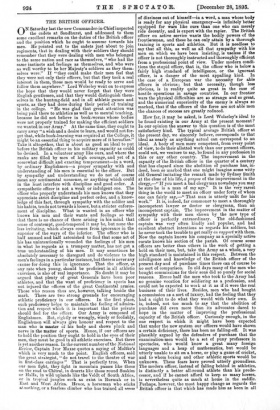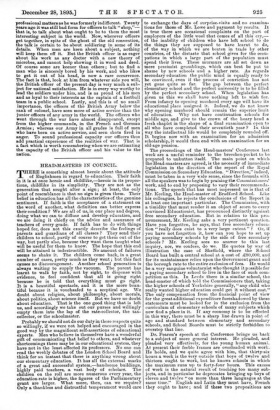THE BRITISH OFFICER.
ON Saturday last the new Commander-in-Chief inspected the cadets at Sandhurst, and addressed to them some excellent remarks on the duties of the British officer and the position which he ought to assume towards his men. He pointed out to the cadets just about to join regiments, that in dealing with their soldiers they should remember that they were dealing with men who belonged to the same nation and race as themselves, "who had the same instincts and feelings as themselves, and who were as well worthy to be her Majesty's soldiers as they them- selves were." If "they could make their men feel that they were not only their officers, but that they took a real interest in them, those men would be ready to serve and follow them anywhere." Lord Wolseley went on to express the hope that they would never forget that they were English gentlemen, and that they would distinguish them- selves in the hunting-field and in all athletic games and sports, as they had done during their period of training in the college. "He was glad that great attention was being paid there to athletics as well as to mental teaching, because he did not believe in book-worms whose bodies were not properly trained for making the efficient soldiers we wanted in our Army." At the same time, they ought to carry away "a wish and a desire to learn, and would not for- get that, while book-learning was required at the College, it might be an essential thing to acquire more of it hereafter." Take it altogether, that is about as good an ideal to put before the British officer in his military capacity as could be devised. In a volunteer army like ours, and where the ranks are filled by men of high courage, and yet of a somewhat difficult and exacting temperament—in a word, by ordinary Englishmen—a proper sympathy with and understanding of his men is essential to the officer. But by sympathy and understanding we do not of course mean any sentimental nonsense, or anything which could in the least interfere with discipline and good order. A sympathetic officer is not a weak or indulgent one. The officer who properly understands his men knows that they appreciate strict discipline and perfect order, and a know- ledge of this fact, through sympathy with the soldier and his habits, tends not towards a looser, but a stricter enforce- ment of discipline. What is wanted is an officer who knows his men and their wants and feelings so well that there is no chance of there arising in his mind that sense of contempt, good-tempered it may be, but none the less irritating, which always comes from ignorance in the superior of the ways of the inferior. The officer who is half amused and half astonished to find that some act of his has unintentionally wounded the feelings of his men in what he regards as a trumpery matter, has not got a true understanding of his men. It may sometimes be absolutely necessary to disregard and do violence to the men's feelings in a particular instance, but thereis never any excuse for doing this in ignorance. That the officer, at any rate when young, should be proficient in all athletic exercises, is also of real importance. No doubt it may be argued that plenty of great Generals have been poor athletes, and that the want of proficiency in sports has not injured the officers of the great Continental armies. Those who reason thus are, however, talking beside the mark. There are two strong grounds for encouraging athletic proficiency in our officers. In the first place, such proficiency helps to maintain the feeling of admira- tion and respect which it is important that the private should feel for the officer. Our Army is composed of Englishmen. But, rightly or wrongly, wisely or foolishly, Englishmen will always give honour and respect to the man who is master of his body and shows pluck and nerve in the matter of sports. Hence, if our officers are to hold the position they ought to hold in the eyes of their men, they must be good in all athletic exercises. But there is yet another reason. In the current number of the National Beview, Captain Ivor Masse quotes a saying of Moltke's which is very much to the point. English officers, said the great strategist, "do not travel to the theatre of war in first-class carriages" That is perfectly true. When our men fight, they fight in mountain passes like those on the road to Chitral, in deserts like those round Suakim or Haifa, in wild uplands like the Veldt of South Africa, or in tropical jungles such as exist in Burmah or in East and West Africa. Hence, a horseman who sticks at nothing, or a fearless climber who has trained all sense of dizziness out of himself—in a word, a man whose body is ready for any physical emergency—is infinitely better equipped for wars like ours than one who can merely ride decently, and is expert with the rapier. The British officer on active service wants the bodily powers of the frontiersman, and these he can only attain by a thorough training in sports and athletics. But it is needless to say that all this, as well as all that sympathy with his men on which we have been insisting, is useless if the officer is not thoroughly instructed and thoroughly efficient from a professional point of view. Under modern condi- tions the stupid officer, that is, the officer who is below a fairly high standard of intelligence, or the ignorant officer, is a danger of the most appalling kind. In the case of a European war the necessity for able officers is obvious ; but that necessity, though less obvious, is in reality quite as great in the case of hostile operations in savage countries. In our frontier wars the physical difficulties are so strange and so great, and the numerical superiority of the enemy is always so marked, that if the officers of the force are not able men the chances of success are greatly reduced.
How far, it may be asked, is Lord Wolseley's ideal to be found existing in our Army at the present moment? In our opinion the answer to this question is of the most satisfactory kind. The typical average British officer at the present day, we sincerely believe, corresponds to that ideal as nearly as anything actual can correspond to an ideal. A body of men more competent, from every point of view, to do their allotted work than our present officers, could not, we venture to say, be found in any profession in this or any other country. The improvement in the capacity of the British officer in the quarter of a century that has elapsed since the abolition of purchase has, in- deed, been so marked that one might imagine some witty old General imitating the remark made by Sydney Smith at the close of his life, a propos of the improvement in the clergy,—" If you meet a bad clergyman nowadays you may be sure he is a, man of my age." It is the very rarest thing in the world to meet an officer under forty of whom one can fairly say,—" That man is utterly unfit for his work." It is, indeed, far commoner to meet a thoroughly incompetent lawyer or doctor or clergyman, than an incompetent captain. The improvement in the matter of sympathy with their men shown by the new type of officer is perfectly extraordinary. The old-fashioned captain was very often kindly and popular, and had excellent abstract intentions as regards his soldiers, but he never took the trouble to get really en rapport with them. Now the captain knows his company as a specially active curate knows his section of the parish. Of course some officers are better than others in the work of getting a hold on their men, but, take the Army as a whole, a very high standard is maintained in this respect. Between the intelligence and knowledge of the British officer of the present day and of purchase times there can of course be no sort of comparison. In old days many of the men who bought commissions for their sons did so purely for social reasons. Hence half the men who took to the Army had. no genuine vocation for soldiering as a profession, and could not be expected to work at it as if it were the real business of their lives. Besides, men who had bought a commission as a sort of luxury, had the feeling that they had a right to do what they would with their own. It is, indeed, not too much to say that the abolition of purchase did even more than its advocates dared to hope in the matter of improving the professional capacity of the British officer. Curiously enough, in the one respect in which it might have been expected that under the new system our officers would have shown a certain deficiency, there has been no falling-off. It was plausibly argued by the defenders of purchase that the examination-men would be a set of puny professors in spectacles, who would know a great many foreign languages and a heap of mathematics, but would be utterly unable to sit on a horse, or play a game of cricket, and to whom boxing and other athletic sports would be unknown. These fears have proved utterly groundless. The modern officer, instead of falling behind in athletics, is distinctly a better all-round athlete than his prede- cessor, and if he cannot afford to keep so many horses, is nevertheless quite as much at home in the saddle. Perhaps, however, the most happy change as regards the British officer is that which has made him as keen in all professional matters as he was formerly indifferent. Twenty years ago it was still bad form for officers to talk " shop,"— that is, to talk about what ought to be to them the most interesting subject in the world. Now, wherever officers get together, in spite of the ghost of the old convention, the talk is certain to be about soldiering in some of its details. When men are keen about a subject, nothing will keep them off it. But the British officer is as eager about his work as any doctor with a new theory of microbes, and cannot help showing it in word and deed. Of course some are keener than others ; but to find a man who is sincerely bored by his work, and who likes to get it out of his head, is now a rare occurrence. The fact is that, look at him from whatever side you will, the British officer of the present day is very much a sub- litfor national satisfaction. He is in every way worthy to the soldiers under him, and is as proud of his men and as loyal to their interests as the captain of a football team in a public school. Lastly, and this is of no small importance, the officers of the British Army below the rank of colonel, have seen more of active service than the junior officers of any army in the world. The officers who went through the war have almost disappeared, except from the higher commands, in the French and German Armies ; whereas our Army in all grades is full of men who have been on active service, and seen shots fired in anger. To sound professional capacity our officers thus add practical experience of the realities of war. That is a fact which is worth remembering when we are estimating the capacity of the British officer and his value to the nation.



































 Previous page
Previous page